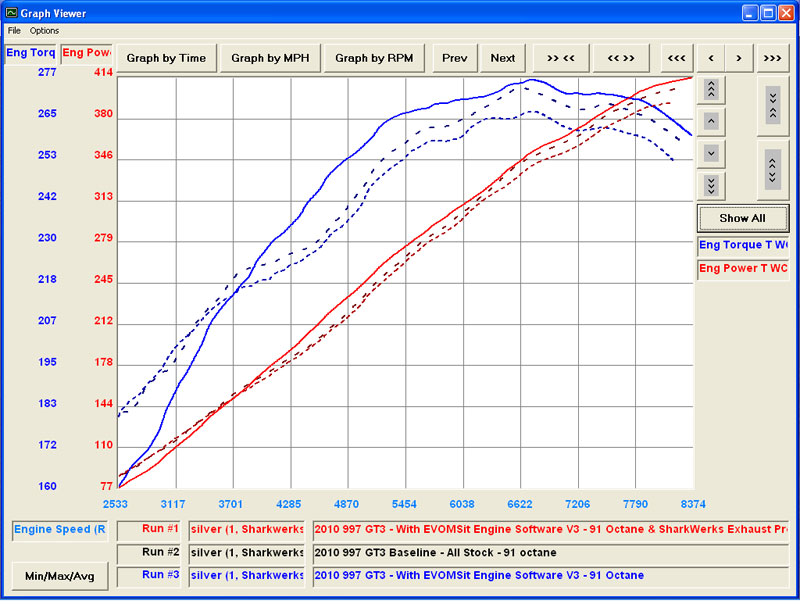|
>
RESULTS
<
2010 Porsche 997 GT3
Bosch ME7 ECU
08-20-2009
Price: $1495
EVOMSit
Performance Software: 404 WHP / 277 WTQ
EVOMSit
Performance Software & Sport Muffler: 414 WHP / 278 WTQ
Baseline
- All Stock: 392 WHP / 267 WTQ (as tested)
Peak Gain:
~14
HP / ~11 TQ (software only)
Peak Gain:
~24
HP / ~19 TQ (software only & Exhaust)
Power
was measured at
the wheels on an independent tuning facility Mustang 500 SE AWD dyno in a controlled
environment in northern California. Dyno runs shown are the
average runs of a 10 run sample group for both the Baseline and
EVOMSit modified runs. Dyno runs are accurately run with the
same RPM start point, same transmission gear, same performance
mode (sport or non-sport) and same cool down time in-between
runs. Measurement was made with 1 x 65,000 CFM main
cooling fan in the front of the vehicle. Dyno room temperature
was 82.2 degrees Fahrenheit for both sets of run groups and was
conducted with CA 91 octane fuel.
The software calibration involves a more aggressive fuel map,
timing advance optimization for specific grades of fuel, and a
more responsive accelerator pedal.
A summary:
With software only, the 2010 GT3 went from 392 WHP to 404 WHP at
the peak. The car gained about this much horsepower for most of
its RPM range. The car gained over 11 ft-lb of torque at its
peak around 6600 RPM and more torque throughout the RPM range.
With the exhaust and software, the gains were higher, bringing
it up to 414 WHP at the peak (22 WHP net gain), more torque at
the peak, and a large gain in torque between 3700 and 5400 RPMs.
You will notice a drop in torque at lower RPMs (below 3500) with
the Track exhaust due to the greatly reduced back pressure, but
there is a significant increase in torque after this point and
horsepower throughout the RPM range. We still recommend our
Street Bypass setup for most owners for several reasons,
including that it does not lose torque like this (and it doesn't
set off car alarms, cause your dog to run away, etc.).

|